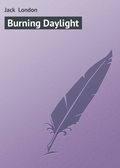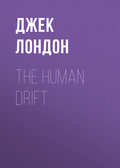
Джек Лондон
Brown Wolf and Other Jack London Stories
MAKE WESTING
Whatever you do, make westing! make westing! – Sailing directions for Cape Horn.
For seven weeks the Mary Rogers had been between 50° south in the Atlantic and 50° south in the Pacific, which meant that for seven weeks she had been struggling to round Cape Horn. For seven weeks she had been either in dirt, or close to dirt, save once, and then, following upon six days of excessive dirt, which she had ridden out under the shelter of the redoubtable Terra Del Fuego coast, she had almost gone ashore during a heavy swell in the dead calm that had suddenly fallen. For seven weeks she had wrestled with the Cape Horn gray-beards, and in return been buffeted and smashed by them. She was a wooden ship, and her ceaseless straining had opened her seams, so that twice a day the watch took its turn at the pumps.
The Mary Rogers was strained, the crew was strained, and big Dan Cullen, master, was likewise strained. Perhaps he was strained most of all, for upon him rested the responsibility of that titanic struggle. He slept most of the time in his clothes, though he rarely slept. He haunted the deck at night, a great, burly, robust ghost, black with the sunburn of thirty years of sea and hairy as an orang-utan. He, in turn, was haunted by one thought of action, a sailing direction for the Horn: Whatever you do, make westing! make westing! It was an obsession. He thought of nothing else, except, at times, to blaspheme God for sending such bitter weather.
Make westing! He hugged the Horn, and a dozen times lay hove to with the iron Cape bearing east-by-north, or north-north-east, a score of miles away. And each time the eternal west wind smote him back and he made easting. He fought gale after gale, south to 64°, inside the antarctic drift-ice, and pledged his immortal soul to the Powers of Darkness for a bit of westing, for a slant to take him around. And he made easting. In despair, he had tried to make the passage through the Straits of Le Maire. Halfway through, the wind hauled to the north 'ard of northwest, the glass dropped to 28.88, and he turned and ran before a gale of cyclonic fury, missing, by a hair's breadth, piling up the Mary Rogers on the black-toothed rocks. Twice he had made west to the Diego Ramirez Rocks, one of the times saved between two snow-squalls by sighting the gravestones of ships a quarter of a mile dead ahead.
Blow! Captain Dan Cullen instanced all his thirty years at sea to prove that never had it blown so before. The Mary Rogers was hove to at the time he gave the evidence, and, to clinch it, inside half an hour the Mary Rogers was hove down to the hatches. Her new main-topsail and brand new spencer were blown away like tissue paper; and five sails, furled and fast under double gaskets, were blown loose and stripped from the yards. And before morning the Mary Rogers was hove down twice again, and holes were knocked in her bulwarks to ease her decks from the weight of ocean that pressed her down.
On an average of once a week Captain Dan Cullen caught glimpses of the sun. Once, for ten minutes, the sun shone at midday, and ten minutes afterward a new gale was piping up, both watches were shortening sail, and all was buried in the obscurity of a driving snow-squall. For a fortnight, once, Captain Dan Cullen was without a meridian or a chronometer sight. Rarely did he know his position within half a degree, except when in sight of land; for sun and stars remained hidden behind the sky, and it was so gloomy that even at the best the horizons were poor for accurate observations. A gray gloom shrouded the world. The clouds were gray; the great driving seas were leaden gray gloom shrouded the world. The clouds were gray; the great driving seas were leadening; even the occasional albatrosses were gray, while the snow-flurries were not white, but gray, under the sombre pall of the heavens.
Life on board the Mary Rogers was gray, – gray and gloomy. The faces of the sailors were blue-gray; they were afflicted with sea-cuts and sea-boils, and suffered exquisitely. They were shadows of men. For seven weeks, in the forecastle or on deck, they had not known what it was to be dry. They had forgotten what it was to sleep out a watch, and all watches it was, "All hands on deck!" They caught snatches of agonized sleep, and they slept in their oilskins ready for the everlasting call. So weak and worn were they that it took both watches to do the work of one. That was why both watches were on deck so much of the time. And no shadow of a man could shirk duty. Nothing less than a broken leg could enable a man to knock off work; and there were two such, who had been mauled and pulped by the seas that broke aboard.
One other man who was the shadow of a man was George Dorety. He was the only passenger on board, a friend of the firm, and he had elected to make the voyage for his health. But seven weeks of Cape Horn had not bettered his health. He gasped and panted in his bunk through the long, heaving nights; and when on deck he was so bundled up for warmth that he resembled a peripatetic old-clothes shop. At midday, eating at the cabin table in a gloom so deep that the swinging sea-lamps burned always, he looked as blue-gray as the sickest, saddest man for'ard. Nor did gazing across the table at Captain Dan Cullen have any cheering effect upon him. Captain Cullen chewed and scowled and kept silent. The scowls were for God, and with every chew he reiterated the sole thought of his existence, which was make westing. He was a big, hairy brute, and the sight of him was not stimulating to the other's appetite. He looked upon George Dorety as a Jonah, and told him so, once each meal, savagely transferring the scowl from God to the passenger and back again.
Nor did the mate prove a first aid to a languid appetite. Joshua Higgins by name, a seaman by profession and pull, but a pot-wolloper by capacity, he was a loose-jointed, sniffling creature, heartless and selfish and cowardly, without a soul, in fear of his life of Dan Cullen, and a bully over the sailors, who knew that behind the mate was Captain Cullen, the lawgiver and compeller, the driver and the destroyer, the incarnation of a dozen bucko mates. In that wild weather at the southern end of the earth, Joshua Higgins ceased washing. His grimy face usually robbed George Dorety of what little appetite he managed to accumulate. Ordinarily this lavatorial dereliction would have caught Captain Cullen's eye and vocabulary, but in the present his mind was filled with making westing, to the exclusion of all other things not contributory thereto. Whether the mate's face was clean or dirty had no bearing upon westing. Later on, when 50° south in the Pacific had been reached, Joshua Higgins would wash his face very abruptly. In the meantime, at the cabin table, where gray twilight alternated with lamplight while the lamps were being filled, George Dorety sat between the two men, one a tiger and the other a hyena, and wondered why God had made them. The second mate, Matthew Turner, was a true sailor and a man, but George Dorety did not have the solace of his company, for he ate by himself, solitary, when they had finished.
On Saturday morning, July 24, George Dorety awoke to a feeling of life and headlong movement. On deck he found the Mary Rogers running off before a howling southeaster. Nothing was set but the lower topsails and the foresail. It was all she could stand, yet she was making fourteen knots, as Mr. Turner shouted in Dorety's ear when he came on deck. And it was all westing. She was going around the Horn at last … if the wind held. Mr. Turner looked happy. The end of the struggle was in sight. But Captain Cullen did not look happy. He scowled at Dorety in passing. Captain Cullen did not want God to know that he was pleased with that wind. He had a conception of a malicious God, and believed in his secret soul that if God knew it was a desirable wind, God would promptly efface it and send a snorter from the west. So he walked softly before God, smothering his joy down under scowls and muttered curses, and, so, fooling God, for God was the only thing in the universe of which Dan Cullen was afraid.
All Saturday and Saturday night the Mary Rogers raced her westing. Persistently she logged her fourteen knots, so that by Sunday morning she had covered three hundred and fifty miles. If the wind held, she would make around. If it failed, and the snorter came from anywhere between southwest and north, back the Mary Rogers would be hurled and be no better off than she had been seven weeks before. And on Sunday morning the wind was failing. The big sea was going down and running smooth. Both watches were on deck setting sail after sail as fast as the ship could stand it. And now Captain Cullen went around brazenly before God, smoking a big cigar, smiling jubilantly, as if the failing wind delighted him, while down underneath he was raging against God for taking the life out of the blessed wind. Make westing! So he would, if God would only leave him alone. Secretly, he pledged himself anew to the Powers of Darkness, if they would let him make westing. He pledged himself so easily because he did not believe in the Powers of Darkness. He really believed only in God, though he did not know it. And in his inverted theology God was really the Prince of Darkness. Captain Cullen was a devil-worshipper, but he called the devil by another name, that was all.
At midday, after calling eight bells, Captain Cullen ordered the royals on. The men went aloft faster than they had gone in weeks. Not alone were they nimble because of the westing, but a benignant sun was shining down and limbering their stiff bodies. George Dorety stood aft, near Captain Cullen, less bundled in clothes than usual, soaking in the grateful warmth as he watched the scene. Swiftly and abruptly the incident occurred. There was a cry from the foreroyal-yard of "Man overboard!" Somebody threw a life buoy over the side, and at the same instant the second mate's voice came aft, ringing and peremptory: —
"Hard down your helm!"
The man at the wheel never moved a spoke. He knew better, for Captain Dan Cullen was standing alongside of him. He wanted to move a spoke, to move all the spokes, to grind the wheel down, hard down, for his comrade drowning in the sea. He glanced at Captain Dan Cullen, and Captain Dan Cullen gave no sign.
"Down! Hard down!" the second mate roared, as he sprang aft.
But he ceased springing and commanding, and stood still, when he saw Dan Cullen by the wheel. And big Dan Cullen puffed at his cigar and said nothing. Astern, and going astern fast, could be seen the sailor. He had caught the life buoy and was clinging to it. Nobody spoke. Nobody moved. The men aloft clung to the royal yards and watched with terror stricken faces. And the Mary Rogers raced on, making her westing. A long, silent minute passed.
"Who was it!" Captain Cullen demanded.
"Mops, sir," eagerly answered the sailor at the wheel.
Mops topped a wave astern and disappeared temporarily in the trough. It was a large wave, but it was no graybeard. A small boat could live easily in such a sea, and in such a sea the Mary Rogers could easily come to. But she could not come to and make westing at the same time.
For the first time in all his years, George Dorety was seeing a real drama of life and death – a sordid little drama in which the scales balanced an unknown sailor named Mops against a few miles of longitude. At first he had watched the man astern, but now he watched big Dan Cullen, hairy and black, vested with power of life and death, smoking a cigar.
Captain Dan Cullen smoked another long, silent minute. Then he removed the cigar from his mouth. He glanced aloft at the spars of the Mary Rogers, and overside at the sea.
"Sheet home the royals!" he cried.
Fifteen minutes later they sat at table, in the cabin, with food served before them. On one side of George Dorety sat Dan Cullen, the tiger, on the other side, Joshua Higgins, the hyena. Nobody spoke. On deck the men were sheeting home the skysails. George Dorety could hear their cries, while a persistent vision haunted him of a man called Mops, alive and well, clinging to a life buoy miles astern in that lonely ocean. He glanced at Captain Cullen, and experienced a feeling of nausea, for the man was eating his food with relish, almost bolting it.
"Captain Cullen," Dorety said, "you are in command of this ship, and it is not proper for me to comment now upon what you do. But I wish to say one thing. There is a hereafter, and yours will be a hot one."
Captain Cullen did not even scowl. In his voice was regret as he said: – "It was blowing a living gale. It was impossible to save the man."
"He fell from the royal-yard," Dorety cried hotly. "You were setting the royals at the time. Fifteen minutes afterward you were setting the skysails."
"It was a living gale, wasn't it, Mr. Higgins?" Captain Cullen said, turning to the mate.
"If you'd brought her to, it'd have taken the sticks out of her," was the mate's answer. "You did the proper thing, Captain Cullen. The man hadn't a ghost of a show."
George Dorety made no answer, and to the meal's end no one spoke. After that, Dorety had his meals served in his stateroom. Captain Cullen scowled at him no longer, though no speech was exchanged between them, while the Mary Rogers sped north toward warmer latitudes. At the end of the week, Dan Cullen cornered Dorety on deck.
"What are you going to do when we get to Frisco?" he demanded bluntly.
"I am going to swear out a warrant for your arrest," Dorety answered quietly. "I am going to charge you with murder, and I am going to see you hanged for it."
"You're almighty sure of yourself," Captain Cullen sneered, turning on his heel.
A second week passed, and one morning found George Dorety standing in the coach-house companionway at the for'ard end of the long poop, taking his first gaze around the deck. The Mary Rogers was reaching full-and-by, in a stiff breeze. Every sail was set and drawing, including the staysails. Captain Cullen strolled for'ard along the poop. He strolled carelessly, glancing at the passenger out of the corner of his eye. Dorety was looking the other way, standing with head and shoulders outside the companionway, and only the back of his head was to be seen. Captain Cullen, with swift eye, embraced the mainstaysail-block and the head and estimated the distance. He glanced about him. Nobody was looking. Aft, Joshua Higgins, pacing up and down, had just turned his back and was going the other way. Captain Cullen bent over suddenly and cast the staysail-sheet off from its pin. The heavy block hurtled through the air, smashing Dorety's head like an egg-shell and hurtling on and back and forth as the staysail whipped and slatted in the wind. Joshua Higgins turned around to see what had carried away, and met the full blast of the vilest portion of Captain Cullen's profanity.
"I made the sheet fast myself," whimpered the mate in the first lull, "with an extra turn to make sure. I remember it distinctly."
"Made fast?" the captain snarled back, for the benefit of the watch as it struggled to capture the flying sail before it tore to ribbons. "You couldn't make your grandmother fast, you useless scullion. If you made that sheet fast with an extra turn, why didn't it stay fast? That's what I want to know. Why didn't it stay fast?"
The mate whined inarticulately.
"Oh, shut up!" was the final word of Captain Cullen.
Half an hour later he was as surprised as any when the body of George Dorety was found inside the companionway on the floor. In the afternoon, alone in his room, he doctored up the log.
"Ordinary seaman, Karl Brun," he wrote, "lost overboard from foreroyal-yard in a gale of wind. Was running at the time, and for the safety of the ship did not dare come up to the wind. Nor could a boat have lived in the sea that was running."
On another page, he wrote: —
"Had often warned Mr. Dorety about the danger he ran because of his carelessness on deck. I told him, once, that some day he would get his head knocked off by a block. A carelessly fastened mainstaysail sheet was the cause of the accident, which was deeply to be regretted because Mr. Dorety was a favorite with all of us."
Captain Dan Cullen read over his literary effort with admiration, blotted the page, and closed the log. He lighted a cigar and stared before him. He felt the Mary Rogers lift, and heel, and surge along, and knew that she was making nine knots. A smile of satisfaction slowly dawned on his black and hairy face. Well, anyway, he had made his westing and fooled God.
THE HEATHEN
I met him first in a hurricane; and though we had gone through the hurricane on the same schooner, it was not until the schooner had gone to pieces under us that I first laid eyes on him. Without doubt I had seen him with the rest of the kanaka crew on board, but I had not consciously been aware of his existence, for the Petite Jeanne was rather overcrowded. In addition to her eight or ten kanaka seamen, her white captain, mate, and supercargo, and her six cabin passengers, she sailed from Rangiroa with something like eighty-five deck passengers – Paumotans and Tahitians, men, women, and children each with a trade box, to say nothing of sleeping-mats, blankets, and clothes-bundles.
The pearling season in the Paumotus was over, and all hands were returning to Tahiti. The six of us cabin passengers were pearl-buyers. Two were Americans, one was Ah Choon (the whitest Chinese I have ever known), one was a German, one was a Polish Jew, and I completed the half dozen.
It had been a prosperous season. Not one of us had cause for complaint, nor one of the eighty-five deck passengers either. All had done well, and all were looking forward to a rest-off and a good time in Papeete.
Of course, the Petite Jeanne was overloaded. She was only seventy tons, and she had no right to carry a tithe of the mob she had on board. Beneath her hatches she was crammed and jammed with pearl-shell and copra. Even the trade room was packed full of shell. It was a miracle that the sailors could work her. There was no moving about the decks. They simply climbed back and forth along the rails.
In the night-time they walked upon the sleepers, who carpeted the deck, I'll swear, two deep. Oh! and there were pigs and chickens on deck, and sacks of yams, while every conceivable place was festooned with strings of drinking cocoanuts and bunches of bananas. On both sides, between the fore and main shrouds, guys had been stretched, just low enough for the foreboom to swing clear; and from each of these guys at least fifty bunches of bananas were suspended.
It promised to be a messy passage, even if we did make it in the two or three days that would have been required if the southeast trades had been blowing fresh. But they weren't blowing fresh. After the first five hours the trade died away in a dozen or so gasping fans. The calm continued all that night and the next day – one of those glaring, glassy calms, when the very thought of opening one's eyes to look at it is sufficient to cause a headache.
The second day a man died – an Easter Islander, one of the best divers that season in the lagoon. Smallpox – that is what it was; though how smallpox could come on board, when there had been no known cases ashore when we left Rangiroa, is beyond me. There it was, though – smallpox, a man dead, and three others down on their backs.
There was nothing to be done. We could not segregate the sick, nor could we care for them. We were packed like sardines. There was nothing to do but rot or die – that is, there was nothing to do after the night that followed the first death. On that night, the mate, the supercargo, the Polish Jew, and four native divers sneaked away in the large whale-boat. They were never heard of again. In the morning the captain promptly scuttled the remaining boats, and there we were.
That day there were two deaths; the following day three; then it jumped to eight. It was curious to see how we took it. The natives, for instance, fell into a condition of dumb, stolid fear. The captain – Oudouse, his name was, a Frenchman – became very nervous and voluble. He actually got the twitches. He was a large, fleshy man, weighing at least two hundred pounds, and he quickly became a faithful representation of a quivering jelly-mountain of fat.
The German, the two Americans, and myself bought up all the Scotch whiskey, and proceeded to stay drunk. The theory was beautiful – namely, if we kept ourselves soaked in alcohol, every smallpox germ that came into contact with us would immediately be scorched to a cinder. And the theory worked, though I must confess that neither Captain Oudouse nor Ah Choon were attacked by the disease either. The Frenchman did not drink at all, while Ah Choon restricted himself to one drink daily.
It was a pretty time. The sun, going into northern declination, was straight overhead. There was no wind, except for frequent squalls, which blew fiercely for from five minutes to half an hour, and wound up by deluging us with rain. After each squall, the awful sun would come out, drawing clouds of steam from the soaked decks.
The steam was not nice. It was the vapor of death, freighted with millions and millions of germs. We always took another drink when we saw it going up from the dead and dying, and usually we took two or three more drinks, mixing them exceptionally stiff. Also, we made it a rule to take an additional several each time they hove the dead over to the sharks that swarmed about us.
We had a week of it, and then the whiskey gave out. It is just as well, or I shouldn't be alive now. It took a sober man to pull through what followed, as you will see when I mention the little fact that only two men did pull through. The other man was the heathen – at least, that was what I heard Captain Oudouse call him at the moment I first became aware of the heathen's existence. But to come back.
It was at the end of the week, with the whiskey gone, and the pearl-buyers sober, that I happened to glance at the barometer that hung in the cabin companionway. Its normal register in the Paumotus was 29.90, and it was quite customary to see it vacillate between 29.85 and 30.00, or even 30.05; but to see it as I saw it, down to 29.62, was sufficient to sober the most drunken pearl-buyer that ever incinerated smallpox microbes in Scotch whiskey.
I called Captain Oudouse's attention to it, only to be informed that he had watched it going down for several hours. There was little to do, but that little he did very well, considering the circumstances. He took off the light sails, shortened right down to storm canvas, spread life-lines, and waited for the wind. His mistake lay in what he did after the wind came. He hove to on the port tack, which was the right thing to do south of the Equator, if – and there was the rub —if one were not in the direct path of the hurricane.
We were in the direct path. I could see that by the steady increase of the wind and the equally steady fall of the barometer. I wanted him to turn and run with the wind on the port quarter until the barometer ceased falling, and then to heave to. We argued till he was reduced to hysteria, but budge he would not. The worst of it was that I could not get the rest of the pearl-buyers to back me up. Who was I, anyway, to know more about the sea and its ways than a properly qualified captain? was what was in their minds, I knew.
Of course the sea rose with the wind frightfully; and I shall never forget the first three seas the Petite Jeanne shipped. She had fallen off, as vessels do at times when hove to, and the first sea made a clean breach. The life-lines were only for the strong and well, and little good were they even for them when the women and children, the bananas and cocoanuts, the pigs and trade boxes, the sick and the dying, were swept along in a solid, screeching, groaning mass.
The second sea filled the Petite Jeanne's decks flush with the rails; and, as her stern sank down and her bow tossed skyward, all the miserable dunnage of life and luggage poured aft. It was a human torrent. They came head-first, feet-first, sidewise, rolling over and over, twisting, squirming, writhing, and crumpling up. Now and again one caught a grip on a stanchion or a rope; but the weight of the bodies behind tore such grips loose.
One man I noticed fetch up, head on and square on, with the starboard-bitt. His head cracked like an egg. I saw what was coming, sprang on top of the cabin, and from there into the mainsail itself. Ah Choon and one of the Americans tried to follow me, but I was one jump ahead of them. The American was swept away and over the stern like a piece of chaff. Ah Choon caught a spoke of the wheel, and swung in behind it. But a strapping Raratonga vahine (woman) – she must have weighed two hundred and fifty – brought up against him, and got an arm around his neck. He clutched the kanaka steersman with his other hand; and just at that moment the schooner flung down to starboard.
The rush of bodies and sea that was coming along the port runway between the cabin and the rail turned abruptly and poured to starboard. Away they went – vahine, Ah Choon, and steersman: and I swear I saw Ah Choon grin at me with philosophic resignation as he cleared the rail and went under.
The third sea – the biggest of the three – did not do so much damage. By the time it arrived nearly everybody was in the rigging. On deck perhaps a dozen gasping, half-drowned, and half-stunned wretches were rolling about or attempting to crawl into safety. They went by the board, as did the wreckage of the two remaining boats. The other pearl-buyers and myself, between seas, managed to get about fifteen women and children into the cabin, and battened down. Little good it did the poor creatures in the end.
Wind? Out of all my experience I could not have believed it possible for the wind to blow as it did. There is no describing it. How can one describe a nightmare? It was the same way with that wind. It tore the clothes off our bodies. I say tore them off, and I mean it. I am not asking you to believe it. I am merely telling something that I saw and felt. There are times when I do not believe it myself. I went through it, and that is enough. One could not face that wind and live. It was a monstrous thing, and the most monstrous thing about it was that it increased and continued to increase.
Imagine countless millions and billions of tons of sand. Imagine this sand tearing along at ninety, a hundred, a hundred and twenty, or any other number of miles per hour. Imagine, further, this sand to be invisible, impalpable, yet to retain all the weight and density of sand. Do all this, and you may get a vague inkling of what that wind was like.
Perhaps sand is not the right comparison. Consider it mud, invisible, impalpable, but heavy as mud. Nay, it goes beyond that. Consider every molecule of air to be a mud-bank in itself. Then try to imagine the multitudinous impact of mud-banks. No; it is beyond me. Language may be adequate to express the ordinary conditions of life, but it cannot possibly express any of the conditions of so enormous a blast of wind. It would have been better had I stuck by my original intention of not attempting a description.
I will say this much: The sea, which had risen at first, was beaten down by that wind. More: it seemed as if the whole ocean had been sucked up in the maw of the hurricane, and hurled on through that portion of space which previously had been occupied by the air.
Of course, our canvas had gone long before. But Captain Oudouse had on the Petite Jeanne something I had never before seen on a South Sea schooner – a sea-anchor. It was a conical canvas bag, the mouth of which was kept open by a huge hoop of iron. The sea-anchor was bridled something like a kite, so that it bit into the water as a kite bites into the air, but with a difference. The sea-anchor remained just under the surface of the ocean in a perpendicular position. A long line, in turn, connected it with the schooner. As a result, the Petite Jeanne rode bow on to the wind and to what sea there was.
The situation really would have been favorable had we not been in the path of the storm. True, the wind itself tore our canvas out of the gaskets, jerked out our topmasts, and made a raffle of our running-gear, but still we would have come through nicely had we not been square in front of the advancing storm-centre. That was what fixed us. I was in a state of stunned, numbed, paralyzed collapse from enduring the impact of the wind, and I think I was just about ready to give up and die when the centre smote us. The blow we received was an absolute lull. There was not a breath of air. The effect on one was sickening.
Remember that for hours we had been at terrific muscular tension, withstanding the awful pressure of that wind. And then, suddenly, the pressure was removed. I know that I felt as though I was about to expand, to fly apart in all directions. It seemed as if every atom composing my body was repelling every other atom and was on the verge of rushing off irresistibly into space. But that lasted only for a moment. Destruction was upon us.
In the absence of the wind and pressure the sea rose. It jumped, it leaped, it soared straight toward the clouds. Remember, from every point of the compass that inconceivable wind was blowing in toward the centre of calm. The result was that the seas sprang up from every point of the compass. There was no wind to check them. They popped up like corks released from the bottom of a pail of water. There was no system to them, no stability. They were hollow, maniacal seas. They were eighty feet high at the least. They were not seas at all. They resembled no sea a man had ever seen.
They were splashes, monstrous splashes – that is all. Splashes that were eighty feet high. Eighty! They were more than eighty. They went over our mastheads. They were spouts, explosions. They were drunken. They fell anywhere, anyhow. They jostled one another; they collided. They rushed together and collapsed upon one another, or fell apart like a thousand waterfalls all at once. It was no ocean any man had ever dreamed of, that hurricane centre. It was confusion thrice confounded. It was anarchy. It was a hell-pit of sea-water gone mad.







